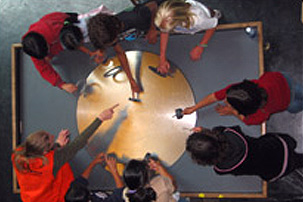Which is bigger, an electron or an atom?
 If you're reading this science blog, you probably know the right answer. And that would make you a little more informed than the average American, according to a recent National Science Foundation report.
If you're reading this science blog, you probably know the right answer. And that would make you a little more informed than the average American, according to a recent National Science Foundation report.
Getting kids grounded in science at a young age can go a long way to fostering understanding of science as an adult. But according to research led by the Lawrence Hall of Science in Berkeley, we Californians aren't exactly paving the way to a future rich with science literacy. Not to quote too many reports here, but the folks at LHS found that 80 percent of elementary school teachers in California spend little or no time on science at all.
At the same time, an Education Department survey of parents found that the vast majority of them consider science education important. Yet the No Child Left Behind Act has focused study in elementary grades on reading and math, at the expense of science. Complicating matters is the fact that many elementary school teachers say they feel unprepared to teach science, and there’s little opportunity for them to up their skills.
For someone like me who works for a science museum, this state of affairs isn't exactly news. But I began to reflect on it in a different way after discussing the LHS report with a group of colleagues from other science education organizations at a recent QUEST partner meeting.
